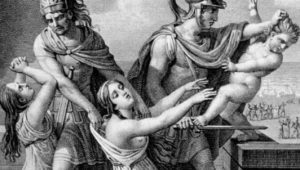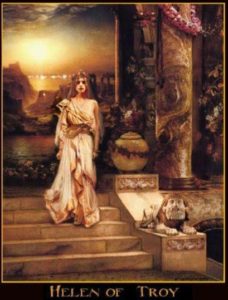CultureBreaking NewsFeature Story
The unknown story behind the Trojan War, writes Shuktara Samkalpa

Sept. 7: The Trojan War took place between the people of Troy and Greece. It is commonly said that the reason of the war was the Queen of Greece, Helen, who had eloped with Prince Paris of Troy. Some say it was because of some political reasons. Most people blame Troy and say they brought their own downfall. HOWEVER, that is not the case: only Troy should NOT be blamed for the war. You all would agree if you know the real unknown story behind the Trojan War!
 It all began when I had participated in a play on World Children’s Acting Day few years ago. I was told to act as a Trojan prince, Astyanax, the son of Hector, – the great warrior of Troy.
It all began when I had participated in a play on World Children’s Acting Day few years ago. I was told to act as a Trojan prince, Astyanax, the son of Hector, – the great warrior of Troy.
Astyanax died before even he was fully able to understand what was happening around him properly. One day his father was playing with him and everything was fine, and the next day his father was gone. It is said that Astyanax was only 3 years old when he faced his death at the hands of the Greek soldiers.
In our Bengali play written by Sishir Das, Astyanax had apparently died when he was a bit older than that, say similar to the age of Amal – the character of the Dakghar or Post Office – another play written by Rabindra Nath Tagore.
I was delighted to play the part since I was already interested in Greek mythology. I read a few more books related to the Greek myths and was happy to play the part.
During the rehearsals and production of the play, however, there was only one thing bothering me continuously- ‘why did Helen elope in the first place, when she already had riches and a luxurious life Greece?’ The Greeks are also known for their loyalty. So what could have changed Helen in a different way?
I started researching on the net, but was not getting satisfactory answers. After a year or so, suddenly I got a book which satisfied me and answered all my queries properly: “OLYMPUS: An Indian retelling of the Greek myths” by Devdutt Pattanaik. After reading the book, I could join the different threads of Greek mythology and understand the real story behind the Trojan War.
 The seed of the Trojan War was prepared to be planted by a man who had wronged another and had not kept his promise. The story of the Trojan War really starts with Tantalus.
The seed of the Trojan War was prepared to be planted by a man who had wronged another and had not kept his promise. The story of the Trojan War really starts with Tantalus.
It all started when Tantalus had tricked the Gods and had served them the meat of his own son, Pelops, to test their ability to recognize human flesh and also their ability to bring the dead back to alive.
For his this action, Zeus cast him deep down in the Tartarus – a prison where criminals serve punishment. Pelops was brought back to life. He had grown up to be a handsome youth and Poseidon had claimed him to be his own lover just like Zeus had taken Ganymede of Troy before.
However as Zeus would not allow any descendant of Tantalus in Olympus, Poseidon had to return the lad back to earth. As an act of his love, he gave the boy a pair of horses which can run on land as well as water.
After he returned to earth, Pelops heard that the King of Pisa, Oenomaus, had organized a chariot competition where he himself will participate and if anyone else can be the winner, he would get to marry his charming, stunning daughter, Hippodamia.
But as always in Greek mythology, there was a catch. Oenomaus’s horses were gifts from the War God, Ares and they always assured him victory. He didn’t want his daughter to be married to someone as he himself had fallen for her beauty and it was also foretold that he would perish at the hands of his son-in-law. Another condition was that those who would get defeated by the king in the race would be beheaded.
 As Pelops entered Pisa, he found several severed heads of the suitors hanging on the gate. But then, as soon as Hippodamia saw Pelops, she fell in love with him and was eager to assure his victory. Together they hatched a plan. The spoke with Myrtilus, the royal stable-keeper and offered him Hippodamia’s virginity if he helped Pelops win. Myrtilus, who had always loved the princess in secret, was delighted at this offer and agreed. He replaced the bronze pins in the chariot with bee wax ones. Hence during the race the chariot fell apart and Oenomaus fell to his death. On the day of their marriage, Myrtilus reminded the couple of their promise. In response, Pelops caught hold of Myrtilus and threw him off a cliff. Falling to his death, Myrtilus invoked the Olympians and cursed Pelops and all his descendants would have unfaithful spouses.
As Pelops entered Pisa, he found several severed heads of the suitors hanging on the gate. But then, as soon as Hippodamia saw Pelops, she fell in love with him and was eager to assure his victory. Together they hatched a plan. The spoke with Myrtilus, the royal stable-keeper and offered him Hippodamia’s virginity if he helped Pelops win. Myrtilus, who had always loved the princess in secret, was delighted at this offer and agreed. He replaced the bronze pins in the chariot with bee wax ones. Hence during the race the chariot fell apart and Oenomaus fell to his death. On the day of their marriage, Myrtilus reminded the couple of their promise. In response, Pelops caught hold of Myrtilus and threw him off a cliff. Falling to his death, Myrtilus invoked the Olympians and cursed Pelops and all his descendants would have unfaithful spouses.
Supernaturally and non-scientifically speaking, this was supposed to have caused Helen leaving her husband and eloping to Troy with Prince Paris. However the reason and justification of the elopement doesn’t stop here in the layered labyrinth of Greek myths.
Pelops had two sons with Hippodamia, Atreus and Thyestes, and another son, Chrysippus, from an affair with the nymph Axioche. Chrysippus was very talented and handsome and also was the favourite son of Pelops. So Hippodamia and her children hated him.
 One day Chrysippus was found dead and Pelops blamed his death on his wife and their children since they hated Chrysippus from the start. Pelops exiled both his sons and died soon after. Unable to live without her children and spouse, Hippodamia killed herself. Her two exiled sons reached Mycenae, which also needed a new king. Both brothers agreed that the one who presents the people of Mycenae with a golden fleece will be their king. Atreus liked the idea as he already possessed a golden fleece though he was supposed to offer this to the goddess Artemis but then changed his mind.
One day Chrysippus was found dead and Pelops blamed his death on his wife and their children since they hated Chrysippus from the start. Pelops exiled both his sons and died soon after. Unable to live without her children and spouse, Hippodamia killed herself. Her two exiled sons reached Mycenae, which also needed a new king. Both brothers agreed that the one who presents the people of Mycenae with a golden fleece will be their king. Atreus liked the idea as he already possessed a golden fleece though he was supposed to offer this to the goddess Artemis but then changed his mind.
What Atreus did not know was that an angry Artemis had made his wife Aerope fall in love with Thyestes and she had already given her lover the Golden Fleece. So it was Thyestes and not Atreus who presented the people of Mycenae with the Golden Fleece and became their king.
Atreus was angry at his wife’s betrayal. This changed when Hermes arrived with a message to Atreus from Zeus. After listening to the message, Atreus called the people and asked whether the people will have a king who can present them the Golden Fleece or a king who can make the sun travel eastwards. And in front of the people, Atreus made the sun travel eastwards. The people rejected Thyestes as their king and made Atreus their king.
After becoming the king, Atreus first killed his unfaithful wife. Then he invited Thyestes to a feast in which he served the flesh of Thyestes’ own son, which he unknowingly devoured. Thus after hurting and humiliating his brother, Atreus exiled him.
It is said that Aerope’s betrayal is also due to Myrtilus’s curse on Pelops and his descendants. Thyestes was angry after being hurt humiliated and exiled by his brother. He wanted revenge and he was told that if he had a son by incest, he could have his revenge.
Of course, you know what happened next. It is kind of easy to guess in Greek mythology. But it a bit confusing at the same time! Like, I totally forgot who Artemis was and it took at least 5 minutes for me to find it out. So, his daughter was married to his brother while she was pregnant. When the child was born, Atreus taking it to be his, named him Aegisthus.
Pelopia, mother of Aegisthus, bore Atreus two more sons: Agamemnon and Menelaus. In time, Atreus forgave Thyestes and let him return in Mycenae. But as Thyestes had not forgiven Atreus, he revealed Aegisthus the truth about his birth and motivated his stepfather. After Aegisthus murdered Atreus, Pelopia took her own life because she couldn’t decide what was worse: her son killing her husband or public knowledge that her first-born was a product of incest.
 After coming to throne, Thyestes did not have the heart to kill his daughter’s children: his grandsons who were also his nephews. So he exiled them from Mycenae.
After coming to throne, Thyestes did not have the heart to kill his daughter’s children: his grandsons who were also his nephews. So he exiled them from Mycenae.
The two brothers reached Sparta where King Tyndareus had invited suitors to marry his daughters, Clytemnestra and Helen.
Tyndareus of Sparta was married to Leda whose beauty enchanted Zeus and he took the form of a swan to seduce her. Leda delivered two eggs. From the first egg came the mortal Castor and immortal Pollux. From the other egg rose up the plain Clytemnestra and the enchanting Helen. As Castor and Pollux hadn’t returned from Jason’s expedition, the King of Sparta had to search for able sons-in-law to rule Sparta.
The one to marry Helen would also be the ruler of Sparta. Every king who saw Helen had fallen in love with her and would have killed each other to marry her if Tyndareus hadn’t sought help from cunning Odysseus, and he agreed to help given that he would gain Penelope (Tyndareus’s niece) as his wife. The suitors were asked to swear an oath to protect the man who would eventually marry Helen. This being done, straws were drawn and the choice was left to the Fates. Thus did Menelaus win Helen’s hand. Agamemnon was given an army to retake Mycenae and Tyndareus’s second daughter, Clytemnestra, as his wife. So came to pass that the grandsons of Pelops came to rule both Sparta and Mycenae, and living with them was the curse of Myrtilus.
Helen’s marriage to Menelaus did not matter the Olympians, especially not to Aphrodite, who had actually promised her to another man, Prince Paris, as a prize.
It is said that at the wedding of Peleus and the nymph Thetis, every Olympian was invited except Eris, the goddess of discord. Angry, she decided to teach the ones present a lesson. She threw a golden apple amongst them with the words, “For The Most Beautiful”, engraved. Hera, Athena and Aphrodite fought over the apple, each claiming the apple for them.
 None of the Gods present dared to judge them for they fear all three of them. Finally, they were told to go to Prince Paris, who was known for his ‘fair’ judgment and understanding of ‘female beauty’. They went to him and tried to please him with their beauty. When it didn’t work and he wouldn’t decide, they tried to bribe him secretly; Athena promising to make him the most admired warrior in the world, Hera promising to make him the ruler of the greatest kingdom, while Aphrodite promised him the hand of the most beautiful woman on earth, Helen of Sparta. Paris declared Aphrodite worthy of the apple, accepting Helen and earning the anger of Athena and Hera on himself and Troy forever.
None of the Gods present dared to judge them for they fear all three of them. Finally, they were told to go to Prince Paris, who was known for his ‘fair’ judgment and understanding of ‘female beauty’. They went to him and tried to please him with their beauty. When it didn’t work and he wouldn’t decide, they tried to bribe him secretly; Athena promising to make him the most admired warrior in the world, Hera promising to make him the ruler of the greatest kingdom, while Aphrodite promised him the hand of the most beautiful woman on earth, Helen of Sparta. Paris declared Aphrodite worthy of the apple, accepting Helen and earning the anger of Athena and Hera on himself and Troy forever.
The story is interesting and proves that Paris was promised Helen by an Olympian and he deserved Helen. However, the reasoning doesn’t end here. Another story begins…
Troy was named after its king, Troilus who had a son called Ilus, and so Troy was also called Ilium. The son of Ilus, Laomedon, unwittingly became the employer of Poseidon. Since he was strong, Poseidon was given the job to build a wall around Troy. Since walls built by Gods cannot be breached, Zeus sent Aeacus to help Poseidon. The fates decreed that only the sons of Aeacus would able to do so. After the work was done, Laomedon refused to pay Poseidon his entire wages, saying that he did not build the entire wall by himself.
An angry Poseidon sent a monster to torment Troy until Laomedon sacrificed his favourite daughter, Hesione. As Heracles was passing by, the king of Troy pleaded with the mighty warrior to save his child. Heracles agreed to do so in exchange for the celestial horses which were given by Zeus in exchange of Ganymede. Laomedon agreed, but went back on his word after the monster was defeated.
Angry, Heracles breached the walls of Troy with the help of Telamon, son of Aeacus, and attacked the city, killed all of Laomedon’s sons and Laomedon. Only one son had been spared, Podarces who was the youngest of the entire royal clan. Hesione paid a huge ransom for him.
Later, he came to be known as Priam, – the ransomed one. Hesione was claimed by Telamon as his prize and she lived with him in Greece as his concubine. (Imagine, all that could have been avoided only is Laomedon had paid the prizes and wages he owed to the people who deserved it!)
 Out of all these stories, we get more than one background behind the elopement of Helen:
Out of all these stories, we get more than one background behind the elopement of Helen:
- Helen eloped because of a curse on her husband’s family.
- Paris was promised about getting Helen by Aphrodite, the goddess of love.
- The Greeks already had kept back a Trojan woman and the exchange was quite fair.
Maybe, if Tantalus had not angered the gods, his son would have been Poseidon’s lover and stayed with him, avoiding the curse of Myrtilus on his family.
Or if Aphrodite had given Paris what she had promised him before Helen’s marriage to Menelaus, all these could have been avoided.
Or maybe if Eris would had been invited to the wedding, she needn’t had thrown the “Apple of Discord”, causing the beauty contest and the fight of the three goddesses.
Or if Pelops had kept his promise to Myrtilus, the curse would have been avoided.
The war was thus a result of combination of many stupid actions done by many people and many Gods and Goddesses, invariably associated with ego, greed, lust, vindictiveness and violence.
However, we shall never know what might have happened if the they had conducted their actions in a different way. We shall never know the other possible happy ending of the story.
Oh, and a matter of fact, a few Trojans survived and went on to build a new empire, Rome.
**PS: I am grateful to Somdatta Bristi who played the role of Amal with me, Tinku da, alias Bishwajit Das, who directed the play, Sishir Das, the writer of the play, Devdutt Pattanaik, the writer of the book: ‘OLYMPUS’, for my interest and curiosity in Greek mythology so much so I started digging up all these myths.





